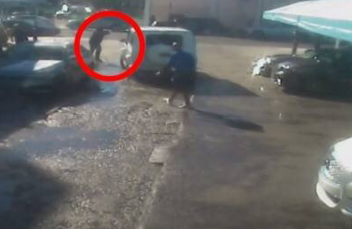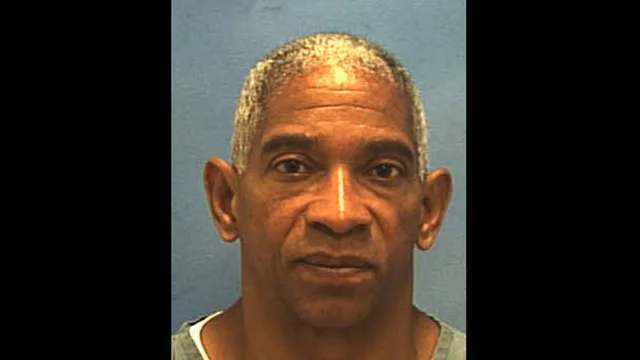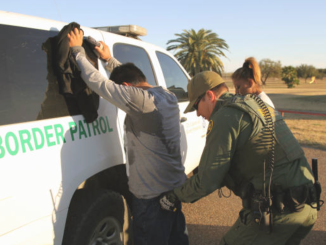
At a Miami Beach car wash in December 2018, a car thief named Jose Antonio Reyes Bermudez pushed an employee and climbed into a customer’s empty Mercedes SUV. As the SUV accelerated forward, the customer ran toward the vehicle — pistol already drawn.
The customer, Stephen Allen Lott, aimed his pistol and fired two shots as the SUV tried to drive away from the lot.
Mortally wounded, Reyes Bermudez — who did not have a gun or a knife — lost control of the stolen SUV. It plowed into the side of a building across the street, destroying an electrical box and cutting power to the street.
In newly released surveillance video, Lott does not look like he’s about to get struck by the SUV. In fact, the SUV had already turned right, and the bullets entered the side of the SUV, one piercing the left side of Reyes Bermudez’s head.
But under Florida’s Stand Your Ground law, Lott had no duty to retreat. He told police that in the split seconds, he thought the SUV was bearing down on him and he fired into the vehicle’s front. And, according to a newly released prosecutor’s memo, he uttered the phrase that helped make charging him legally untenable.
“I was in fear for my life and I shot,” Lott told a Miami Beach police officer.
Years ago, Lott might well have faced a criminal charge in a case that was captured on the surveillance video obtained by the Herald. But the Miami-Dade State Attorney’s Office, citing Florida’s controversial Stand Your Ground self-defense law, has now decided it cannot charge Lott because it cannot disprove that he was in fear for his life.
Prosecutors ruled that Reyes Bermudez, behind the wheel of the stolen SUV, was driving at “a high rate of speed” and posed a threat to employees and others at the car wash. “Mr. Lott had the legal right to stand his ground and use deadly force to protect himself from death or great bodily harm while Mr. Reyes Bermudez was committing and escaping from committing a forcible felony,” according to a final memo recently this month by the State Attorney’s office.
Reyes Bermudez’s relatives could not be reached Monday evening. Over a year ago, a nephew told the Herald that he did not believe Lott should have fired his weapon.
“It takes more time to take a gun out and aim and shoot than just to get out of the way of a running vehicle,” Keu Reyes said.
The decision is likely to add to long-running criticism that Florida’s Stand Your Ground law encourages citizens to become gun-wielding vigilantes, shooting first and asking questions later. The decision also surfaces as Florida Democrats are pushing a bill that would repeal the law — a move that has no realistic chance to pass the Republican-controlled Legislature.
Florida Stand Your Ground law passed in 2005, and eliminated a citizen’s duty to retreat before using deadly force to counter a threat. It also gave judges greater latitude to dismiss criminal charges if they deem someone acted in self-defense.
Dustin Williamson, the general counsel at Everytown for Gun Safety, which is supporting the repeal bill, said the law ties the hands of police and prosecutors and encourages “shooters and other people who use deadly force when they could simply walk away.”
“Because there is no duty to retreat, this law encourages people to put themselves in harm’s way and then claim they had no choice but to use deadly force,” he said.
The law has repeatedly become a social and political flash point. In 2012, police cited the law in initially not arresting a neighborhood watchman in the shooting death of Miami Gardens teenager Trayvon Martin, a case that sparked racial tensions and scrutiny on the state’s self-defense law. The gunman, George Zimmerman, was later charged but acquitted by a Seminole County jury.
In 2017, in a move opposed by law enforcement, Florida lawmakers changed the law, making prosecutors the ones to shoulder the burden of disproving a defendant’s claim of self-defense in a hearing before any jury trial takes place. Prosecutors must now prove by “clear and convincing” evidence that someone was not acting in self-defense.
Former Miami-Dade prosecutor Aubrey Webb said that before the law passed in 2005, gunmen like the one in the Miami Beach car wash case would likely have been prosecuted.
“The Stand Your Ground law gives civilians a license to kill of sorts,” said Webb, who is not involved in the car wash case. “In country where we have among the highest amount of gun deaths in the world annually, we have to ask ourselves why we also pass laws that encourage or condone more use of firearms.”

The Reyes Bermudez shooting happened on the morning of Dec. 18, 2018, at South Beach Finest Hand Car Wash, 1229 18th St.
Lott did not own the Mercedes AMG G53 SUV, but worked for the owner, who asked him to take the vehicle for a wash. As the SUV was being washed, Lott went inside the waiting room, sat on the couch and watched TV.
According to prosecutors, Reyes Bermudez was hanging around the car wash and walked up to an employee who was finishing washing the Mercedes. Pretending to be the SUV’s owner, he took the keys from employee, Marlene Armas, and got in the driver’s seat, while pretending to look to look for the receipt.
The car wash’s manager, Frank Diaz, walked over and asked the the man to get out of the Mercedes. Reyes Bermudez refused, pushed Armas, closed the door and “then started the SUV and accelerated toward the manager,” according to the final memo.
The video shows that Diaz stood off to the side of the SUV as it accelerated, turning right to escape the car wash lot.
At that moment, Lott came running out, yelled and said he stood in front of the SUV’s path. “As the Mercedes SUV approached, Mr. Lott stepped back and braced for impact, believing he was about to be hit by the vehicle,” prosecutor Suzanne von Paulus wrote in her memo.
“I fired because I thought I was about to be hit by the car … I just knew I was going to die today,” he told Miami Beach police.
The bullets did not enter the windshield of the Mercedes, even though Lott claimed he shot at the SUV’s front. Instead, the bullets struck from the side — and one penetrated the left side of Reyes Bermudez’s head, according to the Miami-Dade Medical Examiner’s Office.
Lott’s defense lawyer, Michael Grieco, said his client had no choice but to use force against the man behind the wheel of a vehicle that weighs nearly 5,000 pounds.
“It’s not about what the car is doing, it’s about what the car could do,” Grieco said. “A car is a deadly weapon and it’s appropriate to respond to deadly force when being faced with deadly forced.”
(Grieco, a Democratic Florida House Representative, said he would vote for the current bill to repeal the Stand Your Ground law were it come before the criminal justice sub-committee, of which he is a member).
Von Paulus, the prosecutor, said in her memo that Reyes Bermudez was committing a forcible felony such as carjacking, robbery, burglary — or even attempted murder or aggravated assault and battery for driving at the manager and Lott.
“After reviewing the thorough police investigation, statements of witnesses and the physical evidence, it is the conclusion of the undersigned that charges cannot be filed in this matter as the State would be unable to prove that this homicide was not the result of justifiable use of deadly force under all applicable laws in Florida,” she wrote.
Reyes Bermudez, of Orlando, had previously been convicted of theft, robbery and aggravated assault, and had served six prison terms between 1987 and 2013.
His relatives acknowledged that Bermudez had long grappled with mental-health and substance-abuse issues. One nephew, Keu Reyes, told the Herald in December 2018 that he did not believe Lott should have fired his weapon.
“It takes more time to take a gun out and aim and shoot than just to get out of the way of a running vehicle,” Reyes said.
*story by The Miami Herald


